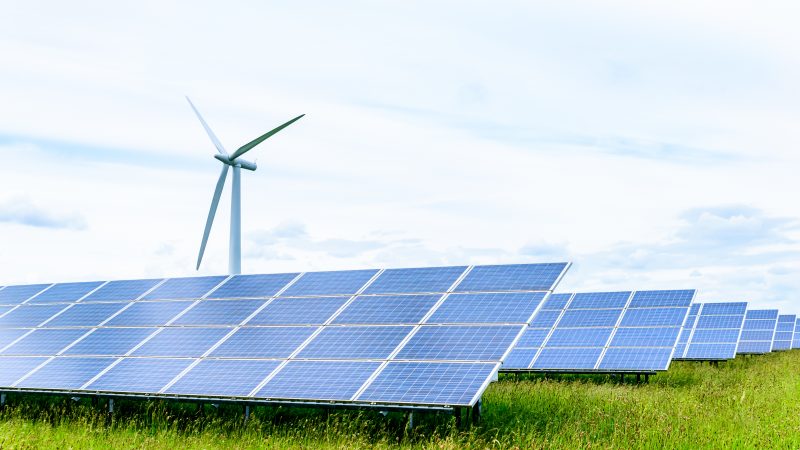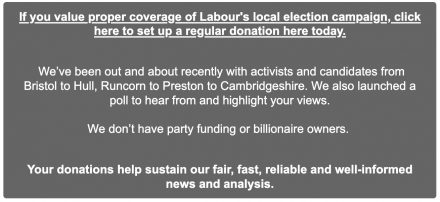
The Tony Blair Institute’s latest climate paper, The Climate Paradox, rightly acknowledges a significant truth – the climate movement has matured. We’ve moved beyond protest into the realm of delivery and progress and the UK has, in many areas, led that shift.
But while parts of the report are compelling, its broader narrative is flawed, and risks doing real damage at a critical political moment. It is wrong about what voters think about climate action. Now is not the time to undermine hard-won progress or repeat the falsehood that clean energy is politically unpopular.
It is nonsense to say that those who oppose net zero are being stifled. In fact, it is hard to read any newspaper or listen to any news report without their ill-informed rhetoric being amplified. But the voters aren’t buying it.
Right now, much of the political commentary is focused on Labour-to-Reform switchers, and Reform UK is expected to perform well in this week’s local elections.
But polling released this week by Persuasion UK shows that even among the small number of Labour voters considering a switch to Reform UK, a majority still support the “Net Zero” target. And the number one issue for voters drifting from Labour? Oil and gas companies ripping off customers, precisely the kind of behaviour a clean, affordable energy system would end.
Far larger numbers of Labour’s 2024 voters are “curious” about the Greens (29%) or the Lib Dems (41%). A move away from climate leadership would alienate many more voters than it might attract. Labour’s core base overwhelmingly supports environmental action and views clean energy progress as one of the most positive achievements of the current government. These voters need to be recognised, not taken for granted.
In short, leaning into Reform-style scepticism on the environment is not only electorally unnecessary—it could be politically disastrous.
‘Climate policy must deliver for those most exposed to today’s crises’
To be clear, we agree with the report in several areas. Yes, emissions are rising globally, despite major strides in renewables and electrification. That is deeply worrying. And yes, it is neither fair nor realistic to expect lower-income households – or entire developing nations – to bear the brunt of climate action while others continue to profit from a fossil-fuelled past.
This is why SERA believes that climate policy must deliver for those most exposed to today’s crises. Those people struggling with the cost of living, housing, jobs, and energy bills. Climate, fairness and growth are not competing goals. In fact, they are inseparable. The clean energy transition is one of the best economic opportunities in a generation if done right.
Clean, homegrown energy is already cheaper than fossil fuels. British emissions have halved since 1990, largely thanks to renewables, and our economy has continued to grow. The cost-of-living crisis has made energy security a top concern for households – and rightly so. But the answer to that is not retreating from clean energy. The answer is accelerating our transition to renewables and reforming the market so households actually see the benefit.
‘Carbon capture must not become a fig leaf for inaction’
One of the most urgent steps the government should take is to decouple UK electricity prices from volatile international gas prices. The current system keeps bills artificially high – even though wind and solar are now far cheaper to produce. Fixing this would bring immediate household relief, and make clear that clean energy works not just for the climate, but for people’s wallets.
The report is also right to stress the role of technology but it’s odd to see this pitted against renewable energy, which is itself a triumph of industrial innovation. From battery storage to offshore wind, it’s technology that has driven the UK’s clean energy mission forward. We agree that innovation will continue to be vital in areas where decarbonisation is hardest, such as steel and cement. We welcome investment in these areas, but urge caution around carbon capture and storage. While it may be part of the mix, it must not become a fig leaf for inaction elsewhere.
And while we’re talking about proven technologies, let’s not forget the power of nature. Forests, wetlands and peatlands are currently the most effective, scalable way to draw down carbon and protect communities from flooding and extreme weather. We agree with TBI that investment in nature-based solutions should be a cornerstone of UK strategy.
‘We shouldn’t retreat, we should deliver’
This Labour government has already done more than at any in history for faster rollout of renewables, better insulation, more affordable bills, and jobs in the green economy. This is not the time to undermine the enormous progress that the UK has made. Rather, it’s a moment to accelerate—to build a fairer, cleaner, more resilient economy.
Blair was once the future, but it is now Keir Starmer, Rachel Reeves and Ed Miliband who are carrying that pragmatic, hopeful mantle forward and showing that bold action on climate can be delivered hand-in-hand with economic transformation.
The 20th century was the fossil fuel century. Twenty-five years into the 21st, we face a choice. Do we double down on dirty, outdated energy models that prop up autocrats and price-gougers? Or do we invest in the clean technologies, skilled jobs, and thriving natural world that the future demands?
The public is ready. The economics are clear. And Labour is leading. We shouldn’t retreat. We should deliver.
Please take just 5 minutes to complete this survey created by our friends at Campaign Lab. They’re keen to explore new ways to campaign and this work will help figure out the best ways to help Labour win. Plus, you’ll have the chance to win a prize of up to £500 as a thank you for your time.
Read our coverage of the 2025 local elections:
- Expert predicts ‘bad night’ with no net Labour gains
- Analysis: What’s a good night for Labour?
- Where’s Keir? PM barely features in Labour party election broadcasts for the locals
- Analysis: ‘Uxbridgitis: If election results are grim, let’s not learn the wrong lessons again’
- Long shadow of Gaza looms over key Lancashire battleground
- Hull and East Yorkshire mayor election: Labour candidate spars with Reform’s boxing star in UK’s most disillusioned city
- Cambridgeshire & Peterborough mayor election: Nik Johnson on why he’s standing down and Anna Smith on knife-edge Labour-Tory fight to replace him
- The meme elections: Labour’s social media pivot to take fight to Farage
- Inside the West of England mayor campaign, from Tory and Green threats to Dan Norris and low voter awareness
- Runcorn and Helsby: At least 150 Labour MPs visit – but Keir Starmer ain’t one
- Runcorn and Helsby interview: Labour candidate Karen Shore on Reform, the NHS and closing asylum hotels
For more from LabourList, subscribe to our daily newsletter roundup of all things Labour – and follow us on Bluesky, WhatsApp, Threads, X or Facebook.
- SHARE: If you have anything to share that we should be looking into or publishing about this story – or any other topic involving Labour– contact us (strictly anonymously if you wish) at [email protected].
- SUBSCRIBE: Sign up to LabourList’s morning email here for the best briefing on everything Labour, every weekday morning.
- DONATE: If you value our work, please chip in a few pounds a week and become one of our supporters, helping sustain and expand our coverage.
- PARTNER: If you or your organisation might be interested in partnering with us on sponsored events or projects, email [email protected].
- ADVERTISE: If your organisation would like to advertise or run sponsored pieces on LabourList‘s daily newsletter or website, contact our exclusive ad partners Total Politics at [email protected].





More from LabourList
‘If Labour is serious about upskilling Britain, it must mobilise local businesses’
Stella Tsantekidou column: ‘What are we to make of the Labour Together scandal?’
Unitarisation risks weakening local democracy unless communities are put in the driving seat’